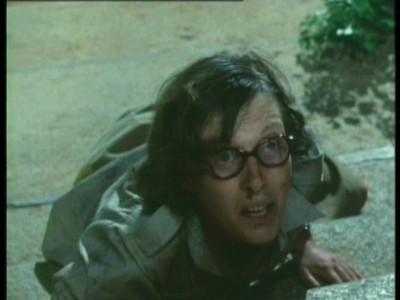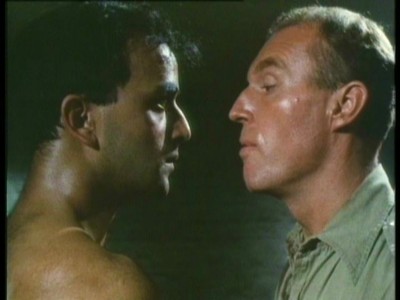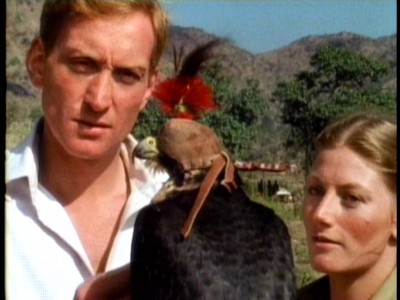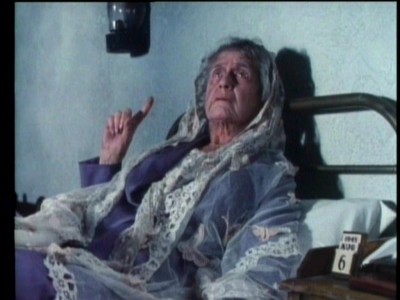| Reviews & Columns |
|
Reviews DVD TV on DVD Blu-ray 4K UHD International DVDs In Theaters Reviews by Studio Video Games Features Collector Series DVDs Easter Egg Database Interviews DVD Talk Radio Feature Articles Columns Anime Talk DVD Savant Horror DVDs The M.O.D. Squad Art House HD Talk Silent DVD
|
DVD Talk Forum |
|
|
| Resources |
|
DVD Price Search Customer Service #'s RCE Info Links |
|
Columns
|
|
|
Jewel in the Crown - The 25th Anniversary Edition, The
A&E has released The Jewel in the Crown - The 25th Anniversary Collection, a four-disc edition of the smash 1984 Granada Television miniseries, based on author Paul Scott's famous The Raj Quartet novels. Released at the height of England's renewed fascination with the last remnants of their "empire" in the 1980s (when the Falkland Islands war raged and the upcoming transfer date for Hong Kong finally sinking in with the British public), The Jewel in the Crown pulls no punches in its largely negative depiction of England's rule over India, as told in a complex, multi-character narrative that stresses the inevitable clash of cultures that occurs when one outside group occupies and subjugates another. However, any notion a potential buyer may have that this particular DVD edition is "special" because it has been timed to come out on the 25th anniversary of the series, should be discouraged: there are major transfer problems and zero extras.

Far too long (the miniseries consists of 14 episodes, for a total running time of about 12 and a half hours) and narratively complex to adequately summarize here, the main storyline of The Jewel in the Crown evolves out of the 1942 imprisonment of Hari Kumar (Art Malik), an English public school-educated Indian who, after his parents die (his father killed himself when he lost his fortune), finds himself living in fictional Mayapore, India with his Aunt Shalini (Kamini Kaushal). Neither fish nor fowl ("...too English for the Indians; too Indian for the English") in politically torn India, Kumar works as a journalist for a small newspaper, and experiences the daily prejudices from both sides of the coin as an Indian who sees himself exclusively as a Britisher. "Accepted" because of his wealth and his school (Chillingborough) back in England, Kumar (who doesn't even speak the native language) finds out his dark skin is the only determiner of his worth in colonial India - to both sides. Regardless of his own self-image as an "Englishman," and regardless of his sophistication and education, he's just another Indian - and thus a second-class human being - to the class system set up by the ruling English powers. And precisely because of his sophistication, his education, his cultured English voice and his remoteness from his own Indian identity, he's viewed with suspicion by the native population who view him more as one of the rulers, than the ruled.
Kumar, through socialite friend Lili Chatterjee (Zohra Sehgal), meets Daphne Manners (Susan Wooldridge), an awkward British nurse whose father was governor of Mayapore's province many years back. Despite the obvious social, cultural and even political dangers, the two become friends, and then finally, lovers, as they meet secretively at the Bibighar Gardens and make love in a small outdoor temple. But Muslim extremists see the couple and attack them, beating Hari and gang-raping Daphne. This violent act enrages Captain Ronald Merrick (Tim Pigott-Smith), the district superintendent of the Indian Police Force, who immediately suspects Kumar and his friends of the rape. Merrick had had a previous run-in with Kumar, which angered the racist Merrick who believed Hari was part of Gandhi's "Quit India" insurgency. As well, the violent, deeply conflicted Merrick had asked Daphne to marry him - a request she refused. Merrick, his psyche twisted by racial hatred, envy for the upper-class Army officers and diplomats who belong to a secret class of public school privilege he will forever be shut out of, and an inability to accept a long-held secret about himself, goads him on to arrest Hari and his friends and sadistically torture Kumar. Hari, though, refuses to defend himself, because he wishes to honor Daphne's pleas not to ever mention that they were lovers. Hari and his friends are tried for the crime, but they are imprisoned not for that offense, but under a general security clause that the English courts used for persons who were believed to be a threat to the regime. This unfair act enrages the populace, who riot, and who never forget that Merrick was responsible for the frame-up.
The story then shifts to the Layton family, where WAC officer Sarah Layton (Geraldine James) and her sister Susan (Wendy Morgan), neighbors of Daphne's aunt, Lady Manners (Rachel Kempson), await news of their father, Colonel John Layton (Frederick Treves), who has been captured abroad and who is sitting out the war in a Japanese prison camp. Susan is to wed dullard Army officer Teddy Bingham (Nicholas Farrell), while Sarah remains single - and a virgin. Merrick is still around, now in Army intelligence after having been horribly disfigured during a stretch as an Army commando, and he's trying to wheedle his way into the Layton family, first by appealing to Sarah, and then Susan. His crimes against the Indian people haven't been forgotten, though. His new assistant, handsome, educated Guy Perron (Charles Dance), offers a startling contrast to the twisted Merrick - a contrast that Sarah takes to, eventually. But forces outside both of their control, including the coming independence of India and a suspicious murder of one of their inner circle, threatens their relationship.
SPOILERS ALERT!

I remember The Jewel in the Crown being a big deal on PBS when it premiered there back in 1985, I believe, with quite a lot being written about its "romantic" sweep, and many articles devoted to the stars (particularly Charles Dance, who created quite a stir, despite only appearing in the final third of the miniseries). I don't find the film particularly "romantic," considering how it centers on a particularly unhappy period in a country's history, as well as detailing several relationships, romantic and platonic, that appear quite painful and unresolved (admittedly, some may rejoin that that final bit is the very essence of "romantic," I suppose). I do remember, as well, that The Jewel in the Crown came out during a time of British period pieces, both on TV and the screen, that looked back rather than forward at British culture (such as the massively successful Brideshead Revisited), so perhaps that patina of nostalgic "romance" rubbed off on The Jewel in the Crown, although I can't see how anyone could watch the events of the film and wish for a return to that era. As well, the film has a decidedly anti-romantic irony that would seem to preclude any impression of it as a nostalgic romance. There's a marvelous moment at the beginning of the film, where dipsy Daphne, intoxicated with the sensual aspects of India, comments on how she loves the "smell" of India - to which Lili bemusedly replies, "It's burning dung." Romance versus reality, altered by perception and culture.
No doubt the international success of that snooze-fest Gandhi probably encouraged the go-ahead for the TV production of The Jewel in the Crown, but whereas that Oscar-winning bore truly did negate its own intended goal of criticizing the British "Raj" by being packaged within a glossy, romanticized framework, The Jewel in the Crown is decidedly anti-epic, focusing exclusively on complex, and often uncomfortable, character motivations while avoiding almost every chance to go in a direction we're most comfortable with in this type of film. As the film begins, the doomed romance between Hari and Daphne would seem to be the main storyline that will follow through the rest of the film, and in an important way, it is; its resonance is felt throughout the rest of the story, as the consequences of their breaking the socially-accepted taboo of races not mixing, and the repercussions of the homosexual Merrick's actions in unfairly jailing, torturing, and sexually assaulting Hari, are metaphorically representative of the much larger problems with the British occupation of India.
But whereas the film (Ken Taylor's screenplay is quite faithful to the Paul Scott novels) could have stayed "small" by making itself be just about these lovers, it instead expands, leaving Daphne and Hari behind relatively early in the film (Daphne dies in childbirth, having Hari's daughter, while Hari spends most of the remainder of the film off-camera, in prison), to become a broader representation of the infinitely multifarious tensions that marked the British occupation. And with that "broadening" of character development, an inverse resistence to going "epic" is pursued, with little attention paid to stereotypical "epic" film elements, such as battle scenes or extended romantic interludes. The Jewel in the Crown film adaptation could have been like Lean's Doctor Zhivago, but it's far more uncompromising.
Scott's design, to keep switching viewpoints about the culture clash associated with the British occupation among disparate characters, while threading a central storyline - Kumar's unfair imprisonment, both figuratively and literally, by the dictates of the colonial system - is as closely followed as possible, given the inherent drawbacks of adapting that kind of literary work for a television miniseries. What's particularly satisfying with the basic structure of The Jewel in the Crown, is that the amorphous nature of the storytelling, still grounded by linear plot progression but altered by swings in time lines and occasional forays into the surreal (Barbie, played by Peggy Ashcroft, and her bizarre death scene, structured to be linked with the first atom bomb explosion), perfectly captures one of the novel's main thematic points: the clash of Western formalism with Eastern philosophy. While the British are often concerned with "keeping a lid" on events that are largely of their own making and yet out of their control, the Hindus follow a different course of eternal acceptance (which is viewed as resistence by the British), one that acknowledges the illusion of the concrete "reality" that the British seem so intent to impose on them. And indeed, as we watch The Jewel in the Crown, and we sometimes struggle against our expectations as to how one of these "exotic period romances" should unfold, our anxiety and diverted expectations perfectly match the message intended for us.

DISC ONE
CROSSING THE RIVER
Beset by the political tension of an unsettled era, Gandhi calls for the British to "Quit India." In Mayapore, Police Superintendent Ronald Merrick arrests Indian news reporter Hari Kumar, while on the other side of the river Daphne manners arrives from England.
THE BIBIGHAR GARDENS, QUESTIONS OF LOYALTY
Unrequited in his love for Daphne Manners, Merrick vents his frustration on Kumar in a vicious jailhouse beating. Later, Daphne gives birth in Kashmir, where neighbor Mildred Layton prepares for her daughter's wedding to Indian Army officer Teddie Bingham.
DISC TWO
INCIDENTS AT A WEDDING, THE REGIMENTAL SILVER
Merrick serves as best man at Teddie Bingham's upper-crust wedding to Susan Layton, after which Susan's sister causes a furor with a controversial rendezvous. Meanwhile, the Governor reviews Kumar's case, revealing Merrick's vicious abuse.
ORDEAL BY FIRE, DAUGHTERS OF THE REGIMENT
After Teddie Bingham is killed in action in Burma, Susan Layton persuades her sister to visit Merrick in Calcutta. While there, Sarah is seduced by an officer who wants only to prove the flimsiness of her "noble" values.
DISC THREE
THE DAY OF THE SCORPION, THE TOWERS OF SILENCE
Sarah Layton returns from Calcutta to find Susan has delivered a baby boy, while Merrick returns to be fitted with an artificial arm. Failure and pain drive him to the brink of madness, but it is Susan who loses her grasp on sanity.
AN EVENING AT THE MAHARANEE'S, TRAVELING COMPANIONS
As the war winds down, tension mounts over home rule. Colonel Layton returns to India and Army Intelligence Sergeant Guy Perron is unwillingly assigned to work with Merrick. Sarah, too, learns unwelcome news: Merrick is engaged to her sister.
THE MOGHUL ROOM, PANDORA'S BOX
Merrick is reassigned to Delhi, much to the relief of Guy Perron. On the eve of Indian independence, though, Perron learns of Merrick's untimely death. Questions arise and are suppressed as the rocky transition to home rule begins.
A DIVISION OF THE SPOILS
Perron learns the details surrounding Merrick's murder and Kumar's innocence. Finally, eight days before the nation's independence, the Laytons and Perron prepare to return to England, leaving behind them India's tangled history and its uncertain future.

The DVD:
The Video:
I would imagine that most buyers, after years of conditioning with "anniversary" editions signaling improved transfers and added bonuses, would assume that the The Jewel in the Crown - The 25th Anniversary Collection would promise similar improvements (that "collection" also implies extra-gathered goodies). But no such luck. The Jewel in the Crown unfortunately received the blue-ribbon treatment by English TV standards in 1984: meaning they went halfway around the world with a multi-million dollar budget...and shot the thing on 16mm film. 16mm. You know, the stuff your grandfather used to use for chintzy home movies back in the 50s and 60s? So even on The Jewel in the Crown's best day, the day it came out of the developing lab, it looked inferior to, say...your average F-Troop episode that was shot on beautiful 35mm Technicolor. Well, this is 25 years later, and absolutely no restoration has been attempted on these prints (indeed, nowhere on the box is this indicated - which it surely would have had any restoration been done). The full screen, 1.33:1 video transfers, therefore, look quite poor, with many scratches, dirt, and pinkish faded color. Compression issues do pop up (blacks go green and blocky in the darker scenes), and overall...these are particularly poor transfers, looking on a par with old VHS masters.
The Audio:
And the audio is even worse. The Dolby Digital English 2.0 stereo track is so poorly mixed that frequently, the music and sound effects drowns out the dialogue. Several critical scenes, including an early party scene where important characters are introduced, have dialogue that is obscured by the music and crowd/party noise. And to make matters worse, A&E doesn't provide any close-captions or subtitles to aid in deciphering these maddeningly cloaked scenes. One of the worst audio transfers I've heard in quite some time.
The Extras:
There are zero extras for The Jewel in the Crown - The 25th Anniversary Collection. Some anniversary party.
Final Thoughts:
Uncompromisingly complex in its characterizations, the decidedly anti-epic The Jewel in the Crown is a rare treat for viewers who want their period pieces with a little more depth than the average Doctor Zhivago heartstrings cliches. However, the transfer here for The Jewel in the Crown - The 25th Anniversary Collection is a distinct let-down, so even if you have the old video tapes of the series, there's no need to upgrade to this inferior pressing. The content is first-rate, but the poor transfers and the total lack of extras marks The Jewel in the Crown - The 25th Anniversary Collection a rental only.
Paul Mavis is an internationally published film and television historian, a member of the Online Film Critics Society, and the author of The Espionage Filmography.


|
| Popular Reviews |
| Sponsored Links |
|
|
| Sponsored Links |
|
|
| Release List | Reviews | Shop | Newsletter | Forum | DVD Giveaways | Blu-Ray | Advertise |
|
Copyright 2024 DVDTalk.com All Rights Reserved. Legal Info, Privacy Policy, Terms of Use,
Manage Preferences,
Your Privacy Choices | |||||||














